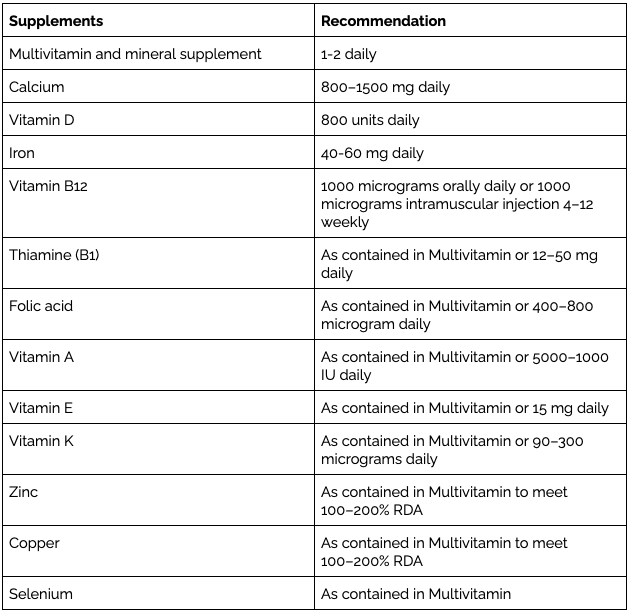Bariatric surgery can improve your quality of life in many ways. One powerful benefit is that it can positively impact fertility and pregnancy.
It takes time to recover from bariatric surgery and implement the new diet and lifestyle changes needed to achieve your weight loss goals. Eventually, your weight will stabilize, and you will become comfortable, physically and emotionally, with the new you.
Not only is pregnancy after gastric bypass surgery or other weight-loss surgeries possible, but you may actually be in a better position to conceive.
Both deciding to undergo bariatric surgery and having a child are life-changing decisions, so it’s important to understand what to expect so you and your growing family can be as healthy as possible. In this guide, we discuss everything you need to know about weight loss surgery and pregnancy.
Can Losing Weight Help You Get Pregnant?
The short answer is yes; bariatric surgery can indeed improve fertility.
Obese women are more likely to develop complications during pregnancy, such as preeclampsia, gestational diabetes, miscarriage, and Polycystic Ovarian Syndrome (PCOS).
Bariatric surgery can significantly lower your chances of encountering problems during pregnancy, decreasing the probability of a miscarriage amongst other complications.
If you are thinking about pregnancy after bariatric surgery, your body will be better prepared for fertility and carrying a baby. Excessive weight puts a great deal of strain on every aspect of your body, including your reproductive system.
Many women experience difficulties with their menstrual cycle and fertility when they are significantly overweight. After weight loss surgery, your reproductive system can finally regulate itself as your body reaps the benefits of your efforts.
Losing weight means a healthier you. And weight surgery and pregnancy go hand-in-hand as they will better equip you to handle all of the changes that will take place while you are expecting.
How Long After Gastric Bypass Surgery Should You Wait to Get Pregnant?
Although weight loss can contribute to a healthy pregnancy, you should not rush into getting pregnant after gastric bypass surgery. Your body will go through a great deal of changes from the surgery alone, and it’s common to be emotional and overwhelmed at times.
Bariatric surgery involves a recovery period, and you have to learn a new way of eating. Major adjustments in your lifestyle have to be made to have the best results. Getting pregnant right after gastric bypass is going to cause more upheaval in your life.
Another concern is the period when you first begin to lose weight. Your rate of weight loss can be rapid in the initial stages following bariatric surgery.
If you become pregnant too soon and experience rapid weight loss, there is the possibility that you and the baby will not receive the proper nourishment needed to thrive during this challenging time.
As a rule of thumb, give yourself at least 18 months after surgery before moving forward with plans to become pregnant. This will ensure you can achieve the best outcome after bariatric surgery and have a healthy pregnancy.
Once You Get Pregnant, Pay Attention to Your Body After Bariatric Surgery
Once you become pregnant after bariatric surgery, you need to listen to what your body is trying to tell you and give it the attention it needs. Pregnancy after gastric bypass surgery may mean you have to deal with more challenges than other women.
You have to be extremely conscientious of your calorie intake. Weight loss surgery forces you to be diligent as you restrict calories to reach your goal for your ideal weight.
Once you become pregnant, you will need to make adjustments to ensure both you and your baby get adequate nutrition.
Work closely with both your obstetrician and dietician to create a healthy eating plan during pregnancy after weight loss surgery. You may find that morning sickness affects you more strongly after bariatric surgery. Talk with your doctor about medications and lifestyle changes that can help you deal with nausea effectively.
Be prepared for changes in your body. You are going to see yourself become larger during pregnancy, and that is completely normal.
After all of your hard work to lose weight, you may begin to panic. Remember that a baby is growing inside you and that you will return to a healthy weight after your delivery.

Monitoring Your Caloric Intake During Pregnancy After Bariatric Surgery
Because bariatric surgery involves removing and rearranging portions of the stomach, you will experience significant changes in the way you consume food.
Take the biliopancreatic diversion (BPD) procedure, for example, a malabsorptive procedure that restricts both the number of nutrients and calories you can absorb into your body.
Patients of other types of bariatric surgeries, such as gastric banding or Roux en-Y gastric bypass surgery, also eat less but rarely have nutritional complications (depending on whether they listen to their doctor’s advice).
To ensure your baby is getting the nutrition it needs to develop properly, speak with your doctor. Furthermore, don’t worry about eating less after your surgery; the baby will take what it needs from the mother.
During the first trimester, you only need 100 extra calories a day and an additional 300 daily extra calories for the next two trimesters. Remember to eat healthy to improve sufficient fetal growth.
Vitamins to Support Pregnancy Post Bariatric Surgery
After bariatric surgery, you will need specific vitamins and minerals to counteract nutritional deficiencies to ensure your baby develops properly. Most types of bariatric surgery have unique supplemental needs depending on the type of weight loss surgery you undergo.
Patients who undergo gastric sleeve surgery, for example, require prenatal vitamins and minerals. Every trimester it may be necessary to undergo blood tests to check nutrition levels. When you first become pregnant, have your calcium, vitamin B12, and iron (ferritin) levels checked.
After BPD, it’s important to have your calcium, vitamin B12, and iron levels checked when you first begin your pregnancy. BPD may also cause your vitamin A levels to change. Find a proper balance of vitamin A intake, as too much can harm your baby. You may also need calcium, iron supplements, and vitamin D on top of prenatal vitamins and minerals.
After gastric bypass, have your blood checked each trimester to ensure you’re not experiencing nutrient deficiencies. Before pregnancy, have your calcium, iron (ferritin), and Vitamin B12 levels checked. Take prenatal vitamins along with calcium, vitamin D, and iron supplements.
No matter what type of weight loss surgery you have, after pregnancy, here is the summary of global recommendations for supplements post-bariatric surgery,

![]()
Pregnancy Complications After Bariatric Surgery
Pregnancy after bariatric surgery can lead to complications. Your risk may be at higher risk of developing gestational diabetes mellitus or high blood pressure that is induced by pregnancy compared to other women.
There is also a good possibility that you will be a candidate for a cesarean. While having a C-section is not a must after bariatric surgery, many doctors will lean in this direction. You should discuss possible problems that you may experience due to your unique situation.
Continue to follow a healthy lifestyle which includes a balanced diet and regular exercise. Keeping your body strong during pregnancy is your best insurance policy for a positive experience.
Learn More About Weight Loss Surgery and Pregnancy
The most important thing you can remember when you are pregnant following weight loss surgery is to be consistent in everything that you do. Continue to eat the way that you should, exercise, stay hydrated and get plenty of sleep. See your doctor regularly.
Having a baby does not have to derail your weight loss efforts. You will always need to be conscious about your weight and the decisions you make.
But you don’t have to do it alone. If you have questions about pregnancy after gastric bypass surgery or other types of bariatric surgery or you are thinking about bariatric surgery for the first time, the team at Olde Del Mar Surgical can help you on your journey to becoming a healthier you.
To learn more about your options, contact us today.
A helpful team of staff members is ready to answer your questions and be your guide as you continue on your quest to reach a weight that is best for you.